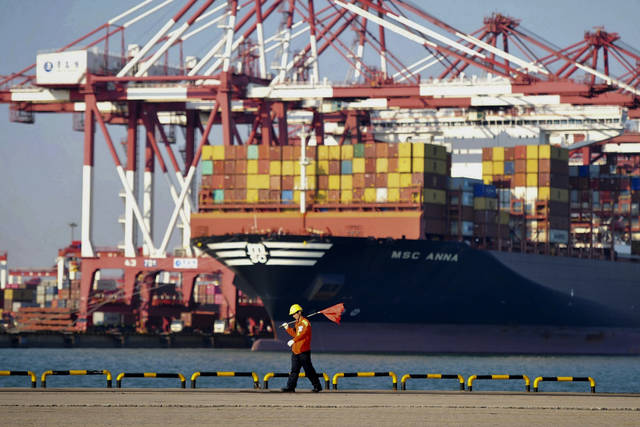BEIJING — China’s economic growth decelerated further in the latest quarter, adding to challenges for communist leaders as they fight a tariff battle with Washington.
The world’s second-largest economy expanded by 6.5 percent over a year earlier in the three months ending in September, government data showed Friday. That was down from 6.7 percent for the quarter ending in July and 6.8 percent for the year’s first three months.
Forecasters expected China’s economy to cool after Beijing tightened credit controls last year to rein in a debt boom. But the slowdown has been sharper than expected, prompting Chinese leaders to reverse course and encourage banks to lend.
“China’s slowdown is a little sharper than expected, but basically fits our narrative for the economy,” said Bill Adams of PNC Financial Services Group in a report.
Beijing’s debt controls and “trade uncertainties” are “taking a bite out of economic momentum,” Adams said.
Communist leaders express confidence their $12 trillion-a-year economy can survive the conflict with U.S. President Donald Trump. But export industries have begun to suffer from American tariff hikes of up to 25 percent on Chinese goods.
Economic performance was “stable overall,” but “we must also see the number of external challenges has increased significantly,” said a government spokesman, Mao Shengyong.
“Downward pressure has increased,” Mao said at a news conference.
Growth in retail spending and investment in factories and other fixed assets, which are much bigger parts of the economy than trade, slowed in the latest quarter, though to still-robust rates.
Retail sales rose 9.1 percent over a year earlier in the first nine months of the year, down 0.1 percent from the first half, according to the National Bureau of Statistics. Investment in factories and other fixed assets rose 5.4 percent in the first three quarters, down 0.6 percent from the first half.
Beijing has rejected U.S. pressure to scale back industrial development plans Washington says are based on stealing or pressuring foreign companies to hand over technology. American officials worry they might threaten U.S. industrial leadership.
The conflict with Washington has prompted communist leaders to step up the pace of a marathon effort to encourage self-sustaining growth driven by domestic consumption and reduce reliance on exports and investment.
Beijing has cut tariffs, promised to lift curbs on foreign ownership in the Chinese auto industry and taken other steps to rev up growth. But leaders reject pressure to scrap plans such as “Made in China 2025,” which calls for state-led creation of Chinese champions in robotics and other technologies.
Washington, Europe and other trading partners complain those plans violate Beijing’s market-opening commitments.
Beijing has responded to previous downturns by flooding the state-dominated economy with credit, but that has swelled debt. The ruling Communist Party has told banks to step up lending, especially to private entrepreneurs who generate China’s new jobs and wealth, but has avoided a full-scale stimulus. Forecasters say it will take the measures some time to work their way through the economy.
Washington has raised tariffs on $250 billion of Chinese goods and Trump says he might extend penalties to almost all imports from China. Beijing responded with its own tariff hikes on $110 billion of American imports but is running out of goods for retaliation due to their lopsided trade balance.
Forecasters say if threatened tariff hikes by both sides are fully carried out, that could cut China’s 2019 growth by up to 0.3 percentage points.
September exports to the United States rose 13 percent despite the tariff hikes, down slightly from August’s 13.4 percent. The country’s politically volatile trade surplus with the United States widened to a record $34.1 billion.
Chinese exporters of lower-value goods such as clothes say American orders fell off starting in April as trade tensions worsened. But makers of factory equipment, medical technology and other high-value goods express confidence they can keep their market share.
Trade accounts for a smaller share of the economy than it did a decade ago but still supports millions of jobs.
On Thursday, the Commerce Ministry promised official help for companies that have suffered due to the American import controls.
“In general, the impact is limited,” said a ministry spokesman, Gao Feng. “Governments at all levels will also take active measures to help enterprises and employees cope with possible difficulties.”


